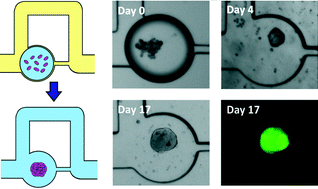Transitioning from multi-phase to single-phase microfluidics for long-term culture and treatment of multicellular spheroids†
Abstract
When compared to methodologies based on low adhesion or hanging drop plates, droplet microfluidics offers several advantages for the formation and culture of multicellular spheroids, such as the potential for higher throughput screening and the use of reduced cell numbers, whilst providing increased stability for plate handling. However, a drawback of the technology is its characteristic compartmentalisation which limits the nutrients available to cells within an emulsion and poses challenges to the exchange of the encapsulated solution, often resulting in short-term cell culture and/or viability issues. The aim of this study was to develop a multi-purpose microfluidic platform that combines the high-throughput characteristics of multi-phase flows with that of ease of perfusion typical of single-phase microfluidics. We developed a versatile system to upscale the formation and long-term culture of multicellular spheroids for testing anticancer treatments, creating an array of fluidically addressable, compact spheroids that could be cultured in either medium or within a gel scaffold. The work provides proof-of-concept results for using this system to test both chemo- and radio-therapeutic protocols using in vitro 3D cancer models.

- This article is part of the themed collection: Lab on a Chip Recent Open Access Articles

 Please wait while we load your content...
Please wait while we load your content...